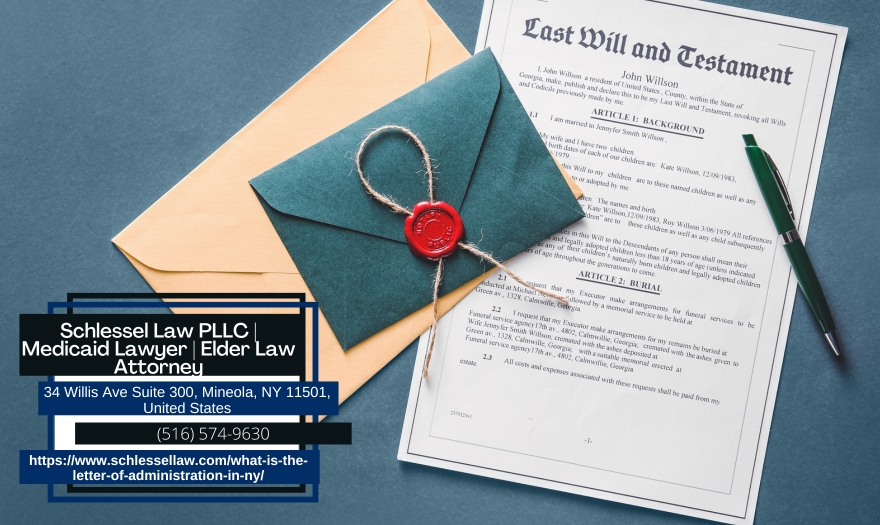Navigating the legal landscape after a loved one’s passing can be challenging, especially when there is no will in place. In such situations, a Long Island estate planning attorney can play a pivotal role in guiding families through the court-supervised process of estate administration. In his article, “What is the Letter of Administration in NY?”, Seth Schlessel (https://www.schlessellaw.com/what-is-the-letter-of-administration-in-ny/), a seasoned attorney at Schlessel Law PLLC, provides clear insights into how the New York legal system addresses this issue and what steps must be taken to manage the estate effectively.
When someone dies intestate—without a will—in New York, the court must appoint an administrator to handle the deceased’s estate. A Long Island estate planning attorney can assist in obtaining Letters of Administration, which are official court documents that grant legal authority to a person (usually an heir) to collect and distribute the estate’s assets. Seth Schlessel outlines the importance of these letters and the procedural requirements involved, emphasizing that they are among the first steps necessary to settle an estate.
The responsibilities of a Long Island estate planning attorney extend to helping clients determine the correct type of letter required, as New York offers several options: Limited Letters for restricted tasks, Temporary Letters for urgent matters, and Ancillary Letters when an out-of-state decedent has property in New York. According to Seth Schlessel, each type is tailored to meet specific legal and practical needs depending on the estate’s circumstances. He notes that "each estate is unique, and the Letters of Administration required to permit their distribution vary accordingly."
Seth Schlessel breaks down eligibility for filing, noting that the court designates administrators based on a priority order under New York’s Intestate Succession Act. Spouses are prioritized, followed by children, parents, and other close relatives. He explains that if more than one individual has equal priority, waivers must be signed to establish who will proceed with the petition. These waivers do not affect a person’s right to inheritance; they simply clarify who will manage the estate.
The process of applying for Letters of Administration involves multiple steps. Applicants must file a petition in the Surrogate’s Court in the county where the decedent lived, along with supporting documents like the death certificate and a list of heirs. Schlessel points out that the court may require additional documentation depending on the estate’s details, such as an Affidavit of Due Diligence or Sole Heirship. He also acknowledges that delays may occur due to court backlogs or if the application is contested.
Once Letters of Administration are issued, the appointed administrator takes on a range of duties, from opening an estate bank account and securing a tax ID to distributing assets and paying off debts. Seth Schlessel explains that the absence of these letters would prevent access to the decedent’s accounts, obstruct property transfers, and block communication with institutions such as banks and government agencies.
Schlessel also describes the necessity of obtaining certified copies of the Letters of Administration, as various institutions will require original documents to process transactions. He highlights the availability of the Certificate of Appointment of Administrator, a formal document printed on watermarked blue paper, which may be required in certain official transactions.
The article emphasizes the legal nuances involved in estate administration, especially when complications like disputes over kinship or the presence of out-of-state property arise. Seth Schlessel offers clarity on how to address these complications through the correct type of administrative proceeding and required documentation.
Working with a Long Island estate planning attorney from Schlessel Law PLLC helps reduce delays and confusion. Seth Schlessel underscores the importance of legal support, especially when the legal landscape becomes more demanding due to missing documents, lost wills, or familial disagreements. He and his team offer comprehensive support throughout the petition process and beyond, ensuring legal compliance while helping families carry out their loved ones’ final affairs.
Letters of Administration serve as the foundation for estate management when no will is in place. Seth Schlessel provides guidance that simplifies the legal framework and highlights the importance of understanding one's legal rights and responsibilities. The article acts as a resource for those beginning the estate administration journey in New York.
Those facing the loss of a family member without a will can benefit from legal counsel early in the process. Guidance from Seth Schlessel and his team at Schlessel Law PLLC can help prevent costly missteps and streamline the court process. Timely legal support is often the key to managing an estate responsibly and efficiently.
About Schlessel Law PLLC
Schlessel Law PLLC provides legal services in estate planning, probate, and elder law across Long Island and New York. Led by attorney Seth Schlessel, the firm assists clients with wills, trusts, guardianship, and estate administration matters. Their team is committed to offering legal guidance tailored to each client's unique circumstances, helping families protect their interests and navigate the legal system with clarity.
Embeds:
Youtube Video: https://www.youtube.com/watch?v=uPt-yhd9v1E
GMB: https://www.google.com/maps?cid=7387587768064061142
Email and website
Email: seth@schlessellaw.com
Website: http://www.schlessellaw.com/
Media Contact
Company Name: Schlessel Law PLLC
Contact Person: Seth Schlessel
Email: Send Email
Phone: (516) 574-9630
Address:34 Willis Ave Suite 300
City: Mineola
State: New York 11501
Country: United States
Website: https://www.schlessellaw.com/

